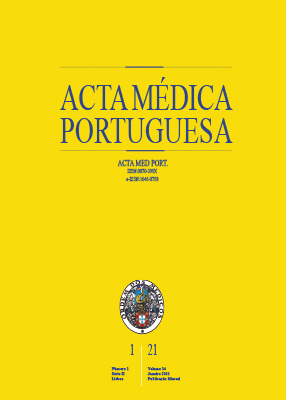Implementing an Influenza Vaccine Effectiveness Study in a Hospital Context in Portugal: The EVA Hospital Project
DOI:
https://doi.org/10.20344/amp.13438Keywords:
Influenza, Human, Influenza Vaccines, Portugal, Respiratory Tract Infections, Reverse Transcriptase Polymerase Chain ReactionAbstract
Introduction: The project ‘Integrated Monitoring of Vaccines in Europe’ aimed to measure seasonal influenza vaccine effectiveness against hospitalised adults, aged 65 years and over, with influenza. We describe the protocol implementation in Portugal.
Material and Methods: We implemented a test-negative design, targeting community-dwelling patients aged 65 years old and over hospitalised with severe acute respiratory illness. Patients were reverse transverse-polymerase chain reaction tested for influenza. Cases were those positive for influenza while others were controls. Most variables were collected using hospital medical records. Selection bias was evaluated by comparison with the laboratory influenza test requests database according to demographic characteristics. Crude, season-adjusted influenza vaccine effectiveness was estimated as = 1 – odds ratio, and 95% confidence intervals were obtained by conditional logistical regression, matched with the disease onset month.
Results: The recruitment rate was 37.8%. Most participants (n = 368) were female (55.8%) and aged 80 years old and over (55.8%). This was similar to values for potentially eligible severe acute respiratory illness patients (80 years old and over: 56.8%, female: 56.2%). The proportion of missing values was below 2.5% for 20 variables and above 5% (maximum 11.6%) for six variables. Influenza vaccine effectiveness estimates were 62.1% against AH1pdm09 (95% confidence intervals: -28.1 to 88.8), 14.9% against A(H3N2) (95% confidence intervals: -69.6 to 57.3), 43.6% against B/Yam (95% confidence intervals: -66.2 to 80.8).
Discussion: Given the non-existence of a coded admission database in either participating hospital the selection of severe acute respiratory illness due to clinical features was the feasible one. These results are only valid for the older adult population residing in the catchment area of the two participating hospitals who were admitted to a public hospital with severe influenza or SARI symptoms.
Conclusion: Despite the low participation rate, we observed comparable characteristics of participants and eligible severe acute respiratory illness patients. Data quality was high, and influenza vaccine effectiveness results were in accordance with the results of meta-analyses and European season-specific estimates. The final sample size was low, which inhibited obtaining estimates with good precision.
Downloads
Downloads
Published
How to Cite
Issue
Section
License
All the articles published in the AMP are open access and comply with the requirements of funding agencies or academic institutions. The AMP is governed by the terms of the Creative Commons ‘Attribution – Non-Commercial Use - (CC-BY-NC)’ license, regarding the use by third parties.
It is the author’s responsibility to obtain approval for the reproduction of figures, tables, etc. from other publications.
Upon acceptance of an article for publication, the authors will be asked to complete the ICMJE “Copyright Liability and Copyright Sharing Statement “(http://www.actamedicaportuguesa.com/info/AMP-NormasPublicacao.pdf) and the “Declaration of Potential Conflicts of Interest” (http:// www.icmje.org/conflicts-of-interest). An e-mail will be sent to the corresponding author to acknowledge receipt of the manuscript.
After publication, the authors are authorised to make their articles available in repositories of their institutions of origin, as long as they always mention where they were published and according to the Creative Commons license.









